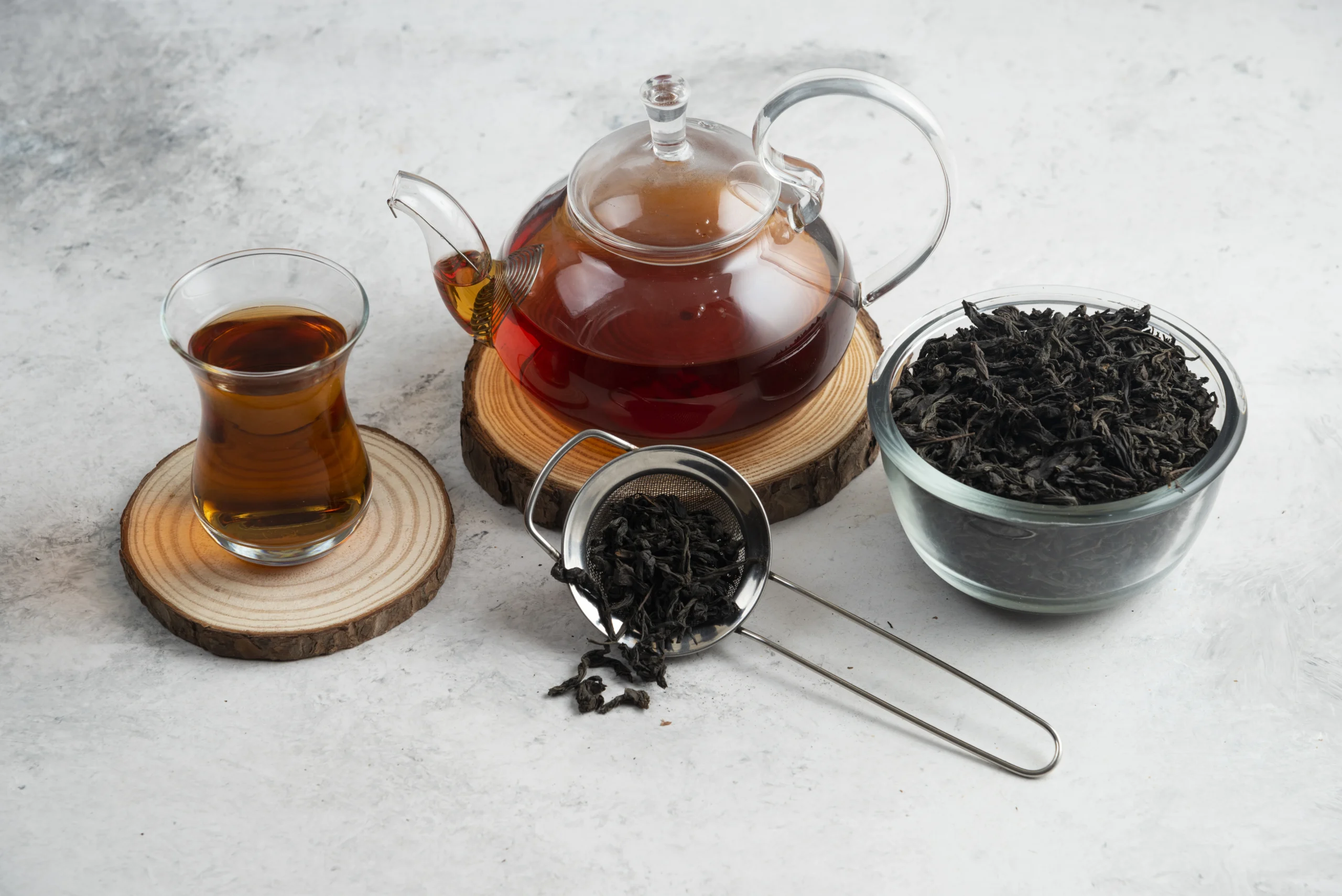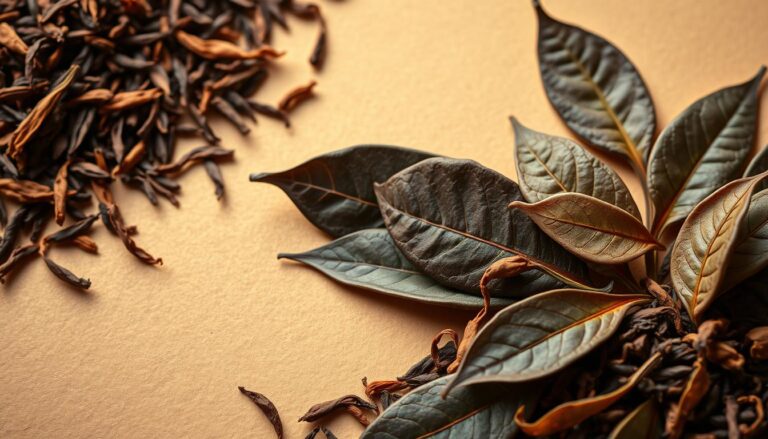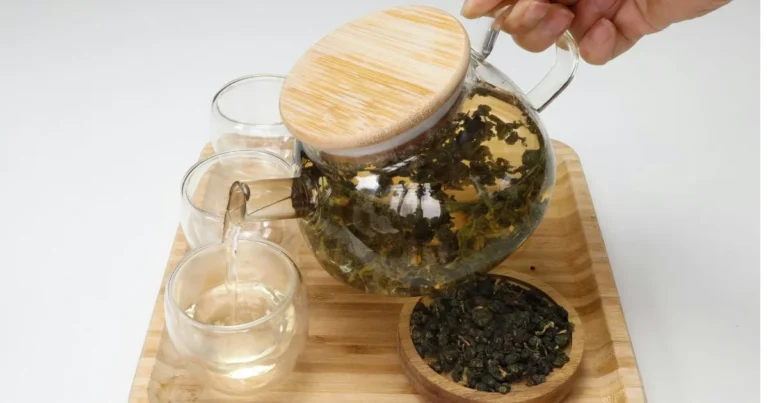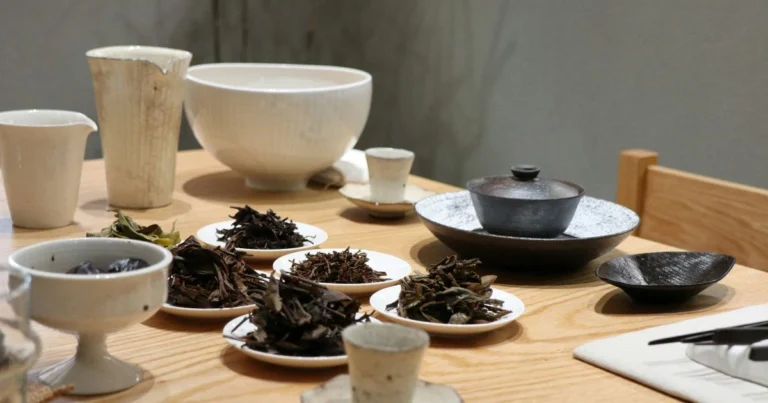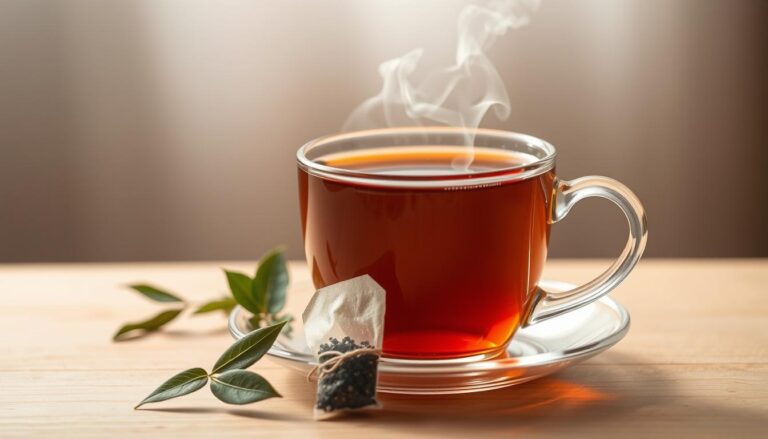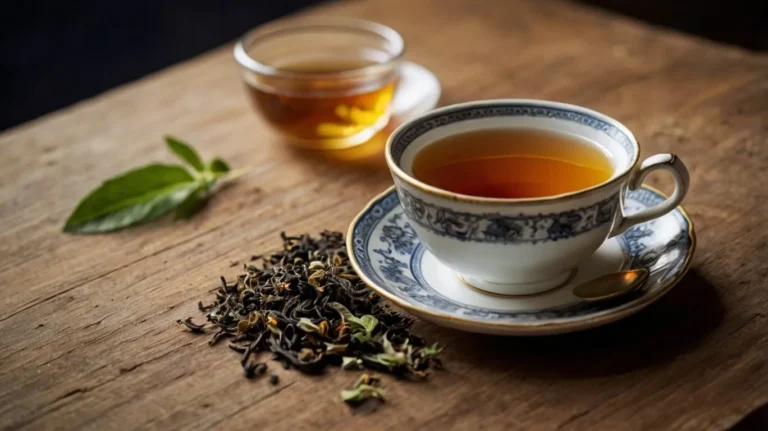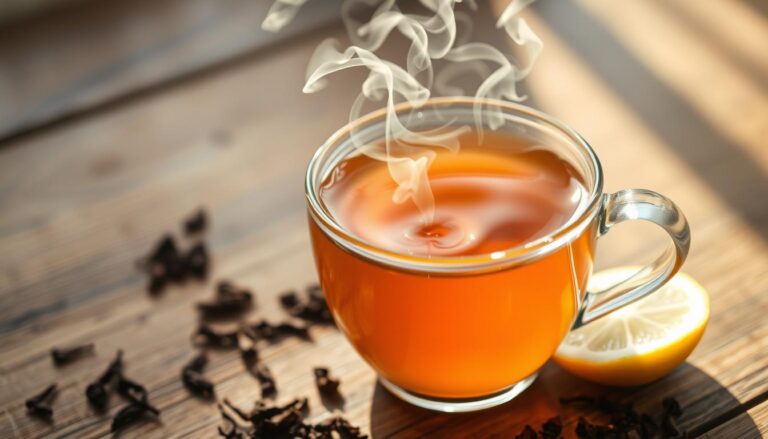How Much Caffeine Is in Black Tea? Surprising Facts, Levels & Comparison
Black tea isn’t just something to sip on — it’s an experience wrapped in flavor and tradition. But for those wondering, how much caffeine is in black tea? It’s a question worth asking, especially since black tea is packed with caffeine. The amount can vary widely, influenced by everything from the tea variety and leaf grade to how it’s brewed and processed. This makes it especially interesting for those who love tea and care about their health.
Starting your day with black tea is a special way to get energized and relaxed at the same time. Caffeine levels in black tea can swing quite a bit, all depending on the variety of tea and how you choose to brew it. So, black tea can be just the right amount of energizing or calming.
Looking into how much caffeine black tea has can teach us a lot. It shows us how the way it’s made affects its caffeine content. From old-fashioned brewing to new methods, each step plays a part in what you get in your cup.
Key Takeaways
- Black tea contains varying levels of caffeine based on multiple factors
- Brewing techniques significantly impact caffeine extraction
- Different tea varieties offer unique caffeine profiles
- Understanding caffeine content helps manage daily intake
- Black tea provides a balanced alternative to coffee
Understanding Black Tea’s Caffeine Content Basics
Black tea offers more than a simple jolt of energy, it’s a rich, layered journey in every cup. Understanding how much caffeine it contains lets you pick the perfect blend to match your mood or moment.Many factors affect black tea’s caffeine. The kind of tea you choose and the way it’s prepared play a crucial role in shaping its flavor, strength, and caffeine kick.. This creates different caffeine profiles.
Chemical Composition of Black Tea
Black tea has a mix of chemicals that shape its caffeine. The main ones are:
- Caffeine molecules
- Polyphenols
- Amino acids
- Theaflavins
Factors Affecting Caffeine Levels
A handful of factors come into play when it comes to how much caffeine ends up in your black tea:
- Tea plant variety plays a key role—especially the Camellia sinensis species.
- Growing altitude and climate
- Harvesting techniques
- Leaf maturity at picking
Natural Caffeine Development During Processing
Caffeine originates in the tea plant as a built-in defense mechanism, acting like nature’s own pest repellent to guard its tender leaves.As leaves grow, they build up caffeine to protect themselves.
| Processing Stage | Caffeine Impact |
| Plucking | Initial caffeine concentration established |
| Withering | Moisture reduction affects caffeine distribution |
| Oxidation | Chemical changes modify caffeine structure |
| Drying | Final caffeine levels stabilized |
Learning about these steps shows the complexity of black tea. It makes every cup special.
How Much Caffeine is in Black Tea: Average Content per Cup
Digging into the caffeine content of black tea reveals just how much it can vary, anywhere from 14 to 70 milligrams per cup, depending on the type and how it’s brewed. This makes black tea a good choice for those wanting a bit of caffeine.
Caffeine levels in tea can vary widely, influenced by a mix of factors like these :
- Tea leaf type and origin
- Brewing time
- Water temperature
- Steeping duration
Traditional black teas such as Assam and Ceylon are known for their higher caffeine content. On average, an 8-ounce cup of black tea provides around 47 milligrams of caffeine, offering a moderate boost. This is less than coffee but still gives a gentle energy boost.
Commercial tea brands might have different caffeine levels. Loose-leaf teas often deliver a stronger caffeine kick compared to their bagged counterparts. This is because they are less processed and have better tea leaves.
“Not all black teas are created equal when it comes to caffeine content.” – Tea Research Institute
Here are some approximate caffeine ranges for different black teas:
- English Breakfast: 40-50 mg per cup
- Earl Grey: 30-45 mg per cup
- Darjeeling: 20-35 mg per cup
Knowing these ranges helps you choose black tea wisely. It lets you understand its caffeine impact better.
Black Tea vs Coffee: Caffeine Content Comparison
Exploring tea caffeine comparison shows black tea and coffee have different caffeine levels. Your morning drink can affect your energy, focus, and health.
Black tea delivers a distinct caffeine experience—smoother and more gradual than the sharp jolt coffee often brings.
Want it with a compa Both contain caffeine, but the way it affects you, and how quickly it kicks in, can vary quite a bit. Knowing this helps you choose better drinks.
Immediate Effects on Energy Levels
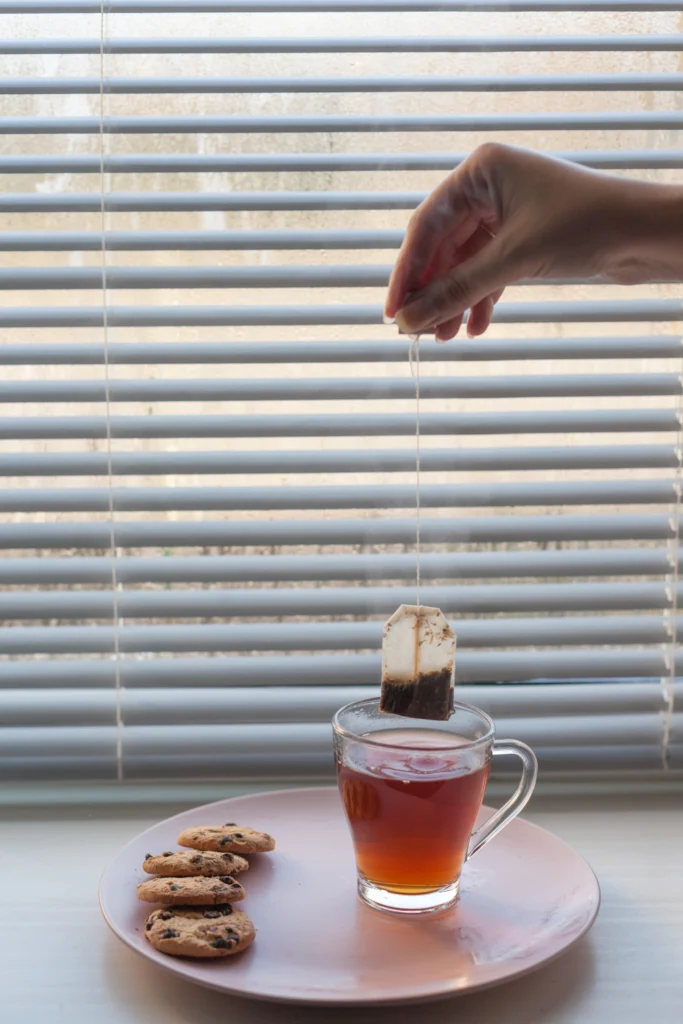

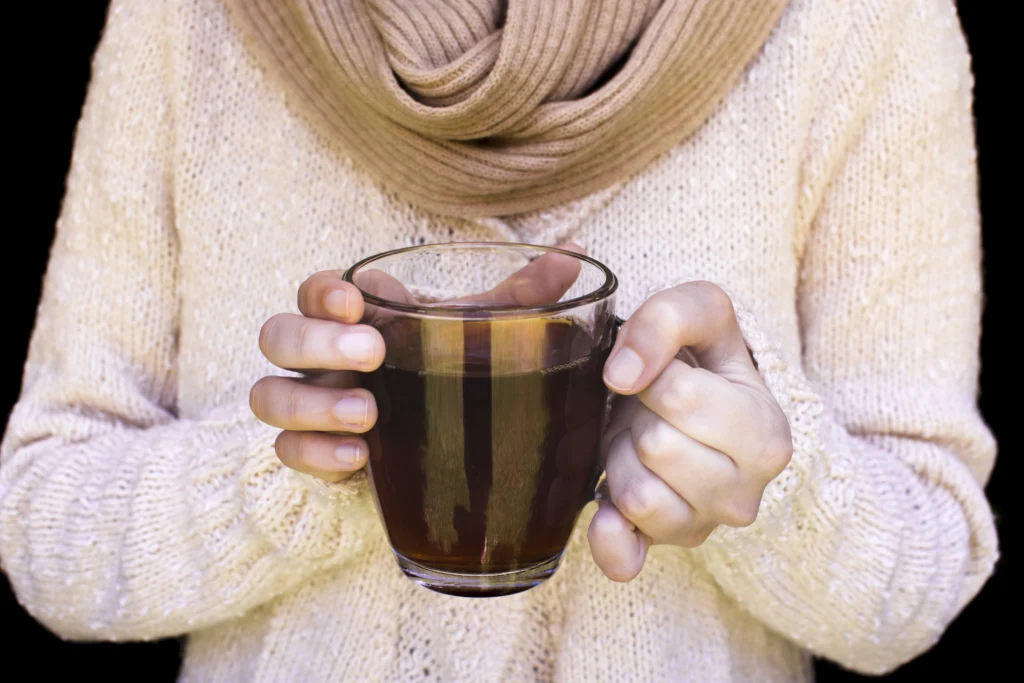

Black tea delivers a calm, sustained lift, more of a gentle rise than coffee’s sharp spike. Thanks to L-theanine, a natural compound in tea, the caffeine is balanced out, helping you stay focused without the jittery crash that coffee can bring.Coffee gives a quick energy boost
- Black tea offers steady mental clarity
- L-theanine helps keep focus calm with caffeine
Duration of Caffeine Release
Tea’s caffeine releases slowly, unlike coffee. A typical cup of black tea has about 47 milligrams of caffeine—around half the kick of an average cup of coffee, which comes in at roughly 95 milligrams. This means tea’s energy lasts longer and is milder.
Impact on Sleep Patterns
What you drink in the evening is key. Black tea’s lower caffeine and special compounds are better for those who can’t handle too much caffeine. Drinking black tea early in the day helps avoid sleep problems.
“Not all caffeine is created equal” – Tea Enthusiast’s Handbook
Knowing these differences helps you get the most energy with the least side effects.
Popular Black Tea Varieties and Their Caffeine Levels
Caffeine content isn’t one-size-fits-all when it comes to black tea, different types can vary quite a bit. The caffeine levels can change based on several factors. Recognizing these differences helps you pick the right tea to suit your energy levels and fit seamlessly into your daily routine.
The caffeine in tea varieties varies a lot among black teas. Certain black teas deliver a stronger caffeine hit than others, influenced by their specific variety and the way they’re processed from leaf to cup. It’s important to know what makes each tea unique.
| Black Tea Variety | Average Caffeine Content (per 8 oz) | Flavor Profile |
| Assam | 60-80 mg | Bold, malty |
| Darjeeling | 40-70 mg | Light, floral |
| Ceylon | 50-65 mg | Bright, citrusy |
| English Breakfast | 50-75 mg | Rich, robust |
A variety of elements can influence how much caffeine ends up in your black tea :
- Leaf size and processing method
- Harvest time and region
- Specific cultivation techniques
- Brewing duration and temperature
“The art of tea is about understanding each variety’s unique character and caffeine profile.” – Tea Expert
Assam black tea usually has the most caffeine, great for a morning pick-me-up. On the other hand, Darjeeling offers a lighter caffeine experience with softer flavors.
Your taste and caffeine sensitivity will help you choose the best black tea. Try different types to find the perfect mix of taste and energy for you.
Brewing Methods and Their Effect on Caffeine Extraction
Learning about brewing techniques can change how you enjoy black tea. It’s not just about steeping leaves in hot water. The method you choose affects how much caffeine you get.
Steeping Time’s Crucial Role
The length of time you steep your tea plays a big role in how much caffeine ends up in your cup, the longer the brew, the stronger the buzz. Longer times mean more caffeine. Here are some tips:
- 1-2 minutes: Mild caffeine release
- 3-5 minutes: Moderate caffeine extraction
- 5-7 minutes: Maximum caffeine potential
Water Temperature Dynamics
Water temperature is also important for caffeine extraction. The hotter the water, the more caffeine it pulls from the tea leaves—heat speeds up the extraction for a bolder brew.Tea experts say to use water between 195-205°F for the best caffeine.
Tea-to-Water Ratio Insights
The ratio of tea to water also matters. A stronger ratio means more caffeine. Try these ratios:
- Standard ratio: 1 teaspoon per 8 ounces of water
- Strong brew: 1.5 teaspoons per 8 ounces
- Light brew: 0.5 teaspoon per 8 ounces
By mastering these brewing techniques, you gain the power to fine-tune both the caffeine kick and the flavor profile of your black tea.
Health Benefits and Risks of Black Tea Caffeine
Caffeine in black tea isn’t just about the energy boost. Knowing how caffeine in tea affects your health can guide your drink choices.
Black tea’s caffeine has many health perks. Studies show it can:
- Boost mental alertness and brain function
- Help with metabolism
- Support heart health
- Offer antioxidant benefits
Yet, there are also risks to consider. Some people might face:
- Difficulty sleeping
- More anxiety
- Interactions with medicines
- Being sensitive to caffeine
“Moderation is key when enjoying black tea’s caffeine content,” says nutritional expert Dr. Sarah Chen.
Experts say to keep caffeine intake under 400 milligrams a day. A black tea cup has about 47 milligrams. This makes it a good choice for those watching their caffeine.
If you’re dealing with health conditions or sensitivities, it’s a smart move to check in with your doctor about how caffeine in tea might affect you. Your health situation affects how black tea might help or challenge you.
Common Black Tea Brands and Their Caffeine Content
Learning about the caffeine in popular tea brands can guide your tea choices. Different black teas have varying caffeine levels. This can shape both your energy levels and the overall experience of savoring your tea.
Commercial Tea Bag Variations
Commercial tea bags show interesting caffeine differences. Brands like Lipton, Twinings, and Bigelow have different caffeine levels in their black teas.
| Brand | Caffeine Content (per 8 oz cup) | Type |
| Lipton Black Tea | 55-70 mg | Commercial |
| Twinings English Breakfast | 45-60 mg | Commercial |
| Bigelow Earl Grey | 40-55 mg | Commercial |
Organic vs Conventional Black Tea Options
Organic and conventional teas have different caffeine levels. Organic teas offer a cleaner taste with similar caffeine amounts.
- Organic brands usually have the same caffeine as conventional teas
- How the tea is processed can affect caffeine levels
- Loose leaf teas often have more consistent caffeine
When picking black tea, think about your caffeine needs and how you brew it. This will make your tea time better.
Decaffeinated Black Tea Options and Processing
If you love black tea but want to cut down on caffeine, decaf black tea is a great choice. Special processing methods can remove most of the caffeine. This leaves you with a tea that’s still flavorful but has less caffeine.
Decaffeination uses a few main techniques to reduce caffeine in tea:
- Carbon Dioxide (CO2) Method: A natural way to remove caffeine using pressurized CO2. It keeps the tea’s taste intact.
- Ethyl Acetate Method: This method uses a plant-based chemical to take out caffeine from tea leaves.
- Water Processing: A gentler method that uses water to remove caffeine. It might change the tea’s taste a bit.
Most decaffeination methods get rid of about 97% of caffeine. This means you can enjoy your black tea without feeling jittery or having trouble sleeping.
When picking decaf black tea, think about these things:
- The method used to decaffeinate it
- How it might change the flavor
- The small amount of caffeine left behind
Brands like Twinings and Bigelow make high-quality decaf black teas. They keep the flavor strong while cutting down on caffeine.
Time of Day and Seasonal Considerations for Black Tea Consumption
Knowing when to drink black tea can boost its benefits and control caffeine intake. Your tea time affects energy, focus, and health.
Drinking black tea in the morning gives you a caffeine kick to start your day. Experts say it’s best between 10 AM and 2 PM. This keeps you alert without messing with your sleep.
- Morning (10 AM – 2 PM): Peak performance and mental clarity
- Afternoon (2 PM – 4 PM): Gentle energy boost
- Evening: Limit or choose decaffeinated options
Seasons change how we like our black tea. In winter, we often prefer stronger, more caffeinated teas. Summer is for lighter, refreshing teas, perfect for iced drinks.
“The right cup of tea at the right time can transform your entire day.” – Tea Enthusiast
Think about your caffeine needs and health when choosing tea times. If you struggle with sleep or anxiety, it’s best to steer clear of black tea later in the day, most experts recommend cutting off caffeine at least six hours before bedtime.
Listen to how your body responds to black tea. what feels right for someone else might not sit the same with you. Everyone’s caffeine sensitivity is a little different. Find your ideal tea time through trial and error.
Conclusion
Black tea has a complex caffeine profile that changes based on several factors. When looking at how much caffeine is in black tea, you’ll see that brewing methods, tea type, and processing are key. Your own experience with tea caffeine can vary a lot, depending on how sensitive you are and how much you drink.
Knowing about black tea caffeine helps you choose the right drink. Whether you’re reaching for a bold morning brew or a gentler cup to ease into the afternoon, understanding the caffeine content helps you sip smarter. Different teas like Earl Grey, English Breakfast, and Assam offer unique caffeine experiences that meet your energy needs.
Black tea is more than just caffeine. Black tea is more than a beverage, it’s a cultural ritual steeped in tradition, offering health perks when sipped mindfully. By focusing on brewing methods, steeping times, and your own caffeine tolerance, you can enjoy black tea as a delightful part of your day.
Remember, moderation is key. Black tea has many benefits, but knowing your caffeine limits is important. Your experience with black tea is unique, and understanding its caffeine helps you make the perfect cup for you.
FAQ
How much caffeine does a standard cup of black tea usually contain?
An 8-ounce cup of black tea typically holds between 14 and 70 milligrams of caffeine. The exact amount depends on factors like the type of tea, how long it’s brewed, and the steeping technique used.Brands like Lipton or Twinings usually have 30-50 milligrams per cup.
Does black tea have more or less caffeine than coffee?
Black tea has less caffeine than coffee. A regular 8-ounce cup of coffee usually contains anywhere from 95 to 200 milligrams of caffeine Black tea, on the other hand, has 14-70 milligrams, making it a milder choice.
Can brewing time affect the caffeine content in black tea?
Absolutely, longer brewing times can draw more caffeine out of the leaves, Steeping it for longer releases more caffeine. Steeping black tea for 3 to 5 minutes typically draws out the majority of its caffeine content, giving you a full-flavored, energizing brew.
Are some black tea varieties higher in caffeine than others?
Yes, caffeine levels vary in black tea varieties. Assam and Ceylon teas have more caffeine. Darjeeling has slightly less. Caffeine levels are also influenced by the type of tea plant, how and where it’s grown, and the way the leaves are processed.
How does water temperature impact caffeine extraction in black tea?
Hot water extracts more caffeine from tea leaves. Using water around 212°F (100°C) and steeping for longer will make your tea more caffeinated. Cooler water or shorter steeping times will result in less caffeine.
Is decaffeinated black tea completely caffeine-free?
No, decaffeinated black tea is not caffeine-free. Most decaffeination methods strip away roughly 97% of the caffeine, leaving just 2 to 4 milligrams in an 8-ounce cup
Can I reduce caffeine in my black tea?
Yes, you can reduce caffeine by steeping for shorter times, choosing lighter teas, or using decaf versions. Briefly steeping the tea for 30 seconds, then discarding the water and brewing again, can cut caffeine by up to 80%.
Are there health risks associated with black tea caffeine?
While moderate caffeine is safe, too much can cause anxiety, insomnia, and a faster heart rate. Health professionals generally recommend that adults keep their daily caffeine intake under 400 milligrams to stay within safe limits.
How does caffeine in black tea compare to other tea types?
Black tea has the most caffeine among tea types. Green tea has 25-35 milligrams, white tea has 15-20 milligrams, and herbal teas are caffeine-free. Black tea contains anywhere from 14 to 70 milligrams of caffeine per cup.
Can pregnant or nursing women drink black tea?
Pregnant and nursing women should limit caffeine. Most doctors advise no more than 200 milligrams daily, which is about 2-3 cups of black tea. Always check with a healthcare professional about your situation.

